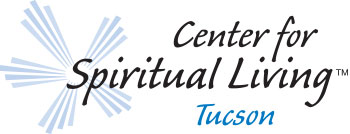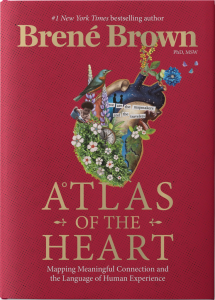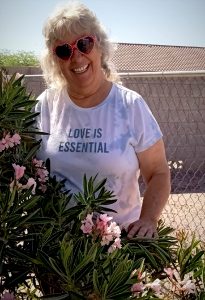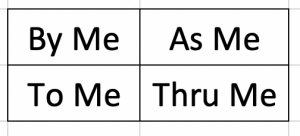How I Described (and Used) The Creative Process
A common example used to explain the creative process is that of growing a plant. You start with the seed (Conscious Mind) which is planted in the ground (Creative Medium) to produce a plant (Manifestation). During Foundations class, we were asked to come up with our own example we would use to illustrate the creative process. Having a background in theater, this is how I described it:
Conscious Mind is represented by the director whose idea it is for the production. To start with, the whole concept lives in his mind only. He then assembles a cast and crew to whom he explains his concept. They are the Creative Medium creating characters, props, costumes, etc. that bring the vision to life. The performances are the Manifestation of this process.
Through this, I was able to relate my theater experience to Science of Mind principles. Now, over a year later, I get to bring my SOM practices to my theater experience.
I’m doing the costumes for the next Live Theatre Workshop’s Children’s Theatre production, Tall Tales: Legends of America. I have 30 characters to costume and 6 weeks in which to do it. When I did costumes for Tucson Shakespeare in the Park, I had just as many characters but we had a couple of months to work with. Luckily, some of the characters only need one article of clothing to identify them.
At first, I’m a little overwhelmed. Some of the pieces I needed were not common articles: multiple cowboy hats, a fringed vest, a green banker’s visor, an aluminum hard hat, etc. But, I remember and recite my manta – Spirit guides me, all is well. I created my costume list of things I wanted and put it out into the Universe. If you are clear in what you desire, the Law must respond with a Yes! Things suddenly started appearing.
Where am I going to find a pair of spurs, maybe two? There they are in the props rack. I’m looking for a red cowgirl skirt to fit a full-figured actor. There it is hiding under the matching shirt and it fits without needing alterations. How about a ten-gallon cowboy hat? I can take that brown top hat and make one. I’ve only got 4 of the 5 Henley shirts I need. Searching the costume racks for the nth time, I finally spot one on a rack I’ve looked through numerous times not seeing it. And it’s the size I’m looking for. Thank you Spirit.
This has been the most relaxed, easy going process I have experienced doing costumes. I knew this time I was not going to be doing it all on my own. I was confident I would be led to find what was needed or inspired on how to create it. With Spirit, everything came together with ease.
Please come see what Spirit has made manifest through the Tall Tales cast and crew for your enjoyment. The show runs weekends July 15 through July 30. (Now Showing – Children’s Theatre | Live Theatre Workshop) I guarantee you will laugh, tap your toes and maybe even tear up a bit.
–Janet Salese










